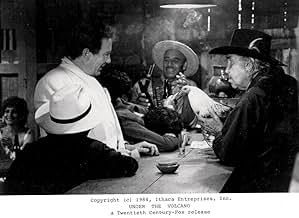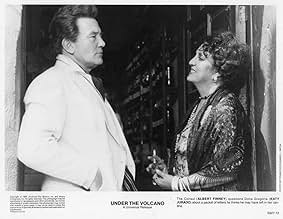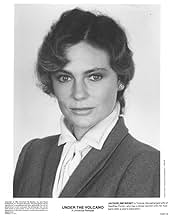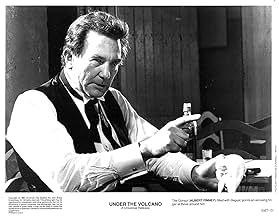NOTE IMDb
6,8/10
6,6 k
MA NOTE
Les dernières 24 heures de la vie de Geoffrey Firmin, un consul anglais solitaire et déprimé qui se retire dans l'alcool pour se réconforter.Les dernières 24 heures de la vie de Geoffrey Firmin, un consul anglais solitaire et déprimé qui se retire dans l'alcool pour se réconforter.Les dernières 24 heures de la vie de Geoffrey Firmin, un consul anglais solitaire et déprimé qui se retire dans l'alcool pour se réconforter.
- Réalisation
- Scénario
- Casting principal
- Nommé pour 2 Oscars
- 3 victoires et 7 nominations au total
Ignacio López Tarso
- Dr. Vigil
- (as Ignacio Lopez Tarzo)
José René Ruiz
- Dwarf
- (as Rene Ruiz 'Tun-Tun')
Eleazar Garcia Jr.
- Chief of Gardens
- (as Eliazar García Jr.)
Salvador Sánchez
- Chief of Stockyards
- (as Salvador Sanchez)
Sergio Calderón
- Chief of Municipality
- (as Sergio Calderon)
Emilio Fernández
- Diosdado
- (as Emilio Fernandez)
Roberto Sosa
- Few Fleas
- (as Roberto Martinez Sosa)
Avis à la une
Albert Finney's performance of alcoholism is shattering and spot on. This movie should be required as adjunctive therapy in the field of alcoholism recovery. The feeling of hopelessness that permeates this movie makes it an experience the viewer should be advised about.
This movie packs a punch and Finney's performance is as exact and nuanced as is possible. His posture, his mental states, emotions, facial expressions, use of language, clothing, physicality are completely consistent with those of an alcoholic in an advanced stage of the disease.
Although it's a one-man movie, the other main players act exactly as real people do when dealing with alcoholics and portray the emotions and feelings that surround alcoholic situations.
This movie is definitely not a walk in the park.
This movie packs a punch and Finney's performance is as exact and nuanced as is possible. His posture, his mental states, emotions, facial expressions, use of language, clothing, physicality are completely consistent with those of an alcoholic in an advanced stage of the disease.
Although it's a one-man movie, the other main players act exactly as real people do when dealing with alcoholics and portray the emotions and feelings that surround alcoholic situations.
This movie is definitely not a walk in the park.
An ex-colleague of mine once recommended this movie to me. When it was released in the cinemas he watched it several times, and he said that if i really was a movie freak, this was something i had to see. So, when a few weeks ago this movie was shown on TV in The Netherlands, i did. When i watched it i didn't know where the story was going, but when it ended and a week after it, it didn't get out of my head. After that week when i was doubting about it was a good or an average movie i ended up with the idea that it really is something special. Albert Finney is really great in this picture as an alcoholic (better than Nicolas Cage in "Leaving Las Vegas") and i totally agree with my ex-colleague that he is one of his favourite actors. It is not a movie for the masses, but when you are a movie-fanatic it is a must.
Under the Volcano could have made as just another 'Lost Weekend' film if not for the attention to a simple narrative (though one that has a lot underneath the surface), and a performance to compellingly take us through the unbalanced emotional state of its protagonist. From what I've read about what the novel became by this adaptation, Huston took out the big poetic bits that made it such an unclassifiable (and as many claimed unadaptable) work and made it into a tale of a man's downfall from grace and good times. The story is as such: Geoffrey Firmin (Finney) is a recently retired consul in Mexico who has that big, admirable personality that comes with those who have lived- or boasted to live- quite a life, and have taken now to mass consumptions of alcohol. It's not even about the enjoyment of it, but a compulsion for 'balance' to drink just to get sober, as it might be. He's also divorced, recently, but his wife (Bisset) comes to him again, wanting once more to patch things up.
This is set in the backdrop of the 'Day of the Dead' festival, and on the brink of world war 2, but these things are, however brilliantly and as a kind of delicate lining around, a backdrop for the emotional and mental and, it should be noted, spiritual struggle of Firmin. Huston never preaches about this man's rotting addiction, and there's no easy sympathy either. We see his emotional state rock from happy and hopeful to the pits of despair following the bullfight his half-brother Hugh (Andrews) takes part in, where he can't basically grasp his own reality anymore. Underneath this surface of the film though, where we're given this proud, unstable character, there's chaos riling about, attached in a way to the mood around, with rumored Nazi collaborators in the midst of things, a near-murdered body on the side of the road, the matter-of-fact metaphors of the symbols of death that (as Huston makes in one of the most Gothic openings to a movie I've ever seen) opens the film with marionette skeletons to an eerie Alex North score.
But lest to say that all credit should go to Huston for his storytelling. It's an interesting film for the first three quarters, though in a way feels like it has to be building for something; here and there, even as we're with these character wandering in a state of mind of disarray (will Firmin and Yvonne stay together, split apart, who will run away are the basic questions, as well as how Andrews might have something to do with it on either side), it starts to feel like it could become meandering. In that last quarter, however, Huston lays on a feeling of dread, maybe not entirely with coincidence, that hasn't been seen since Treasure of the Sierra Madre- something bad just HAS to happen, and it will come out through the worst devils of the protagonist's nature. There is that for Huston, the power of that brothel sequence, the terror and even the dark humor.
The best reason above all else, even as it's one of Huston's most challenging films, is that Finney is so terrific in the role. It's a startling work of an actor taking down his guard, making himself vulnerable and naked, so to speak, to the discord booze has brought to his mind. He gets depth to a guy that should be just another Hemingway figure, of the sorrow that really lies in every little moment and gesture and inflection. It also goes without saying he's one of the top three or four convincing drinkers in modern film. And at the same time it's not easy to peg what he'll do next as an actor, which step he might cross or double-back on. While his co-stars are very good in their parts, he dares to overshadow them with a tour-de-force. Under the Volcano pits its character into hell, and Huston brings us, without going overboard with stylistic flourishes, right along with him.
This is set in the backdrop of the 'Day of the Dead' festival, and on the brink of world war 2, but these things are, however brilliantly and as a kind of delicate lining around, a backdrop for the emotional and mental and, it should be noted, spiritual struggle of Firmin. Huston never preaches about this man's rotting addiction, and there's no easy sympathy either. We see his emotional state rock from happy and hopeful to the pits of despair following the bullfight his half-brother Hugh (Andrews) takes part in, where he can't basically grasp his own reality anymore. Underneath this surface of the film though, where we're given this proud, unstable character, there's chaos riling about, attached in a way to the mood around, with rumored Nazi collaborators in the midst of things, a near-murdered body on the side of the road, the matter-of-fact metaphors of the symbols of death that (as Huston makes in one of the most Gothic openings to a movie I've ever seen) opens the film with marionette skeletons to an eerie Alex North score.
But lest to say that all credit should go to Huston for his storytelling. It's an interesting film for the first three quarters, though in a way feels like it has to be building for something; here and there, even as we're with these character wandering in a state of mind of disarray (will Firmin and Yvonne stay together, split apart, who will run away are the basic questions, as well as how Andrews might have something to do with it on either side), it starts to feel like it could become meandering. In that last quarter, however, Huston lays on a feeling of dread, maybe not entirely with coincidence, that hasn't been seen since Treasure of the Sierra Madre- something bad just HAS to happen, and it will come out through the worst devils of the protagonist's nature. There is that for Huston, the power of that brothel sequence, the terror and even the dark humor.
The best reason above all else, even as it's one of Huston's most challenging films, is that Finney is so terrific in the role. It's a startling work of an actor taking down his guard, making himself vulnerable and naked, so to speak, to the discord booze has brought to his mind. He gets depth to a guy that should be just another Hemingway figure, of the sorrow that really lies in every little moment and gesture and inflection. It also goes without saying he's one of the top three or four convincing drinkers in modern film. And at the same time it's not easy to peg what he'll do next as an actor, which step he might cross or double-back on. While his co-stars are very good in their parts, he dares to overshadow them with a tour-de-force. Under the Volcano pits its character into hell, and Huston brings us, without going overboard with stylistic flourishes, right along with him.
It is the finale of this film that redeems any possible weakness of the story one may entertain in one's mind as one views this film. The ending is so overwhelming, I had to watch it again at once. I then rewatched parts of the film just to luxuriate in the brilliant acting of Albert Finney. This is truly a masterpiece. There have been some criticisms of Ms. Bisset's acting etc, but this is small potatoes compared to the sheer genius of this story and its' realization. The music in the opening credits sets the tone and immediately draws you into the film. You know something profound will happen in the film and to you as you watch this film. Highly Recommended.
This is a fairly forgotten gem from the mid-80s, based on the classic and tragic novel of the same name. The film is also the legendary John Huston's third last movie as a director. Taking place in Mexico during the festival known as the Day of the Dead, the film also works against a backdrop of the early days of WWII, and explores the fragmented love triangle between a former British diplomat (Albert Finney), his estranged wife (Jacqueline Bisset), and his adventurous journalist brother (Anthony Andrews).
Under the Volcano starts out slowly, following the corpse-like wandering of retired diplomat Geoffrey Firmin as he explores the Day of the Dead and seeks out booze to feed his alcoholism. We're given various clues as to what has left him in such a sodden and rambling state, and we learn that his wife divorced him from abroad. Geoffrey proceeds to drink himself into oblivion, and into the fray enters his erstwhile wife Yvonne... testing the waters as it were for a possible reconciliation. Geoffrey's brother Hugh, recently returned from the Spanish civil war, is at a loss as to where he fits in with regards to their relationship, and also in regards to the world itself. The three decide to take a day trip out of town, with Yvonne and Hugh unsure of where Geoffrey's health and state of mind will literally lead them.
This film is a rambling, elegaic swansong to suntouched dreams fortified by alcohol. These three people try to outrun their demons and replace their mistakes with hollow new plans - Yvonne hopes to start her life anew, but Geoffrey's disgracefully drunken state makes him an unpredictable quantity to bank on, especially in regards to whether he can forgive her for the adultery that left him in such a state. Geoffrey tells a story at one point about a colonial named Blackstone, a man who turned native and disliked the puritans who tried to save him so much that he simply just disappeared into the wilderness. There's obviously something about this story that appeals to Geoffrey as he seems to identify with Blackstone so much that he later tells strangers that it's his name, and you can't help but feel that this is the only solution to the problems at hand that he can truly grasp at. Bubbling underneath the surface of the film all this time is a slowly building sense of doom highlighted by the coming of WWII, the ominous woodwind score, and the film's title itself. Geoffrey alludes to a horrific war story at several points, drawing comparisons with the 30s horror film Mad Love (referred to here as The Hands of Orlac) with his belief that "Some things you can't apologise for", and this quote echoes throughout the film whenever the main characters are forced to come face to face with each other's mistakes.
This won't be a film to everyone's taste, it starts out as something approaching a travel-drama but kind of mutates into outright tragedy in it's second half. At the core of Under the Volcano is a staggering performance from Albert Finney as the drunken diplomat. Finney was more than rightfully nominated for a Best Actor Academy Award for his realistic depiction of the life of a hopeless drunk... full of whimsy and cheer and rambling anecdotes, treading a fine line between absolute tankdom and lucidness, and tapping into all kinds of ambivalent emotions that would be far too challenging to a less complex and accomplished actor. Too often the drunk in film is shown as either a figure for comedy, fear or tragedy, but never are they shown as realistically as Finney's characterisation here. I could see shades of every pathetic and hilarious drunk I've ever met at a pub or a party in Under the Volcano's Geoffrey Firmin, and the film makes no compromises whatsoever in showing this for what it is. One of the best performances in film.
HIGHLIGHTS: There's nothing quite like a sinister Mexican dwarf grinning while he makes obscene gestures with his hands. I found this bit to be quite offputting and creepy.
Under the Volcano starts out slowly, following the corpse-like wandering of retired diplomat Geoffrey Firmin as he explores the Day of the Dead and seeks out booze to feed his alcoholism. We're given various clues as to what has left him in such a sodden and rambling state, and we learn that his wife divorced him from abroad. Geoffrey proceeds to drink himself into oblivion, and into the fray enters his erstwhile wife Yvonne... testing the waters as it were for a possible reconciliation. Geoffrey's brother Hugh, recently returned from the Spanish civil war, is at a loss as to where he fits in with regards to their relationship, and also in regards to the world itself. The three decide to take a day trip out of town, with Yvonne and Hugh unsure of where Geoffrey's health and state of mind will literally lead them.
This film is a rambling, elegaic swansong to suntouched dreams fortified by alcohol. These three people try to outrun their demons and replace their mistakes with hollow new plans - Yvonne hopes to start her life anew, but Geoffrey's disgracefully drunken state makes him an unpredictable quantity to bank on, especially in regards to whether he can forgive her for the adultery that left him in such a state. Geoffrey tells a story at one point about a colonial named Blackstone, a man who turned native and disliked the puritans who tried to save him so much that he simply just disappeared into the wilderness. There's obviously something about this story that appeals to Geoffrey as he seems to identify with Blackstone so much that he later tells strangers that it's his name, and you can't help but feel that this is the only solution to the problems at hand that he can truly grasp at. Bubbling underneath the surface of the film all this time is a slowly building sense of doom highlighted by the coming of WWII, the ominous woodwind score, and the film's title itself. Geoffrey alludes to a horrific war story at several points, drawing comparisons with the 30s horror film Mad Love (referred to here as The Hands of Orlac) with his belief that "Some things you can't apologise for", and this quote echoes throughout the film whenever the main characters are forced to come face to face with each other's mistakes.
This won't be a film to everyone's taste, it starts out as something approaching a travel-drama but kind of mutates into outright tragedy in it's second half. At the core of Under the Volcano is a staggering performance from Albert Finney as the drunken diplomat. Finney was more than rightfully nominated for a Best Actor Academy Award for his realistic depiction of the life of a hopeless drunk... full of whimsy and cheer and rambling anecdotes, treading a fine line between absolute tankdom and lucidness, and tapping into all kinds of ambivalent emotions that would be far too challenging to a less complex and accomplished actor. Too often the drunk in film is shown as either a figure for comedy, fear or tragedy, but never are they shown as realistically as Finney's characterisation here. I could see shades of every pathetic and hilarious drunk I've ever met at a pub or a party in Under the Volcano's Geoffrey Firmin, and the film makes no compromises whatsoever in showing this for what it is. One of the best performances in film.
HIGHLIGHTS: There's nothing quite like a sinister Mexican dwarf grinning while he makes obscene gestures with his hands. I found this bit to be quite offputting and creepy.
Le saviez-vous
- AnecdotesOn Albert Finney, director John Huston said, "I think it's the finest performance I have ever witnessed, let alone directed".
- GaffesThe story takes place in 1938, but the car driven by James Villiers that almost hits Albert Finney as he is lying in the road is an MG-TF, which was manufactured between 1953 and 1956.
- Citations
Geoffrey Firmin: How, unless you drink as I do, can you hope to understand the beauty of an old indian woman playing dominoes with a chicken?
- ConnexionsFeatured in At the Movies: Conan the Destroyer/Top Secret!/Under the Volcano (1984)
Meilleurs choix
Connectez-vous pour évaluer et suivre la liste de favoris afin de recevoir des recommandations personnalisées
- How long is Under the Volcano?Alimenté par Alexa
Détails
- Date de sortie
- Pays d’origine
- Sites officiels
- Langues
- Aussi connu sous le nom de
- Under the Volcano
- Lieux de tournage
- Acapantzingo, Morelos, Mexique(Iglesia San Miguel Arcangel: opening scene of the Day of the Dead at dusk)
- Sociétés de production
- Voir plus de crédits d'entreprise sur IMDbPro
Box-office
- Montant brut aux États-Unis et au Canada
- 2 556 800 $US
- Week-end de sortie aux États-Unis et au Canada
- 31 000 $US
- 17 juin 1984
- Montant brut mondial
- 2 556 800 $US
- Durée1 heure 52 minutes
- Mixage
- Rapport de forme
- 1.85 : 1
Contribuer à cette page
Suggérer une modification ou ajouter du contenu manquant

Lacune principale
By what name was Au-dessous du volcan (1984) officially released in India in English?
Répondre

































